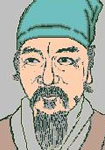《醉桃源(大石·第二)》 周邦彦
临流苏小家。
画阑曲径宛秋蛇。
金英垂露华。
烧蜜炬,引莲娃。
酒香薰脸霞。
再来重约日西斜。
倚门听暮鸦。
作者简介(周邦彦)

周邦彦(1056年-1121年),中国北宋末期著名的词人,字美成,号清真居士,汉族,钱塘(今浙江杭州)人。历官太学正、庐州教授、知溧水县等。徽宗时为徽猷阁待制,提举大晟府。精通音律,曾创作不少新词调。作品多写闺情、羁旅,也有咏物之作。格律谨严。语言典丽精雅。长调尤善铺叙。为后来格律派词人所宗。旧时词论称他为“词家之冠”。有《清真集》传世。
《醉桃源(大石·第二)》周邦彦 翻译、赏析和诗意
《醉桃源(大石·第二)》是一首宋代的诗词,作者是周邦彦。以下是诗词的中文译文、诗意和赏析:
中文译文:
菖蒲叶老水平沙。
临流苏小家。
画阑曲径宛秋蛇。
金英垂露华。
烧蜜炬,引莲娃。
酒香薰脸霞。
再来重约日西斜。
倚门听暮鸦。
诗意:
这首诗描绘了一个宁静美丽、令人陶醉的桃花源。桃花源指的是一个隐居人世、与世隔绝的理想之地。诗中通过描写桃花源中的景物和情境,表达了作者对这个世外桃源的向往和追求。诗词中融入了自然景色、人物形象和意境描写,展现出对自然和闲适生活的向往与热爱。
赏析:
1. 第一句“菖蒲叶老水平沙”,描绘了菖蒲叶子在水面上摇曳的景象,寓意自然的老迈与河滩上水平的沙地。这一句通过对自然景物的描写,传达出宁静与岁月流转的感觉。
2. 第二句“临流苏小家”,描述了作者临近水流住着的小屋,流苏可能指屋檐上的装饰物。这里展示了作者隐居的生活环境,与自然和谐共处。
3. 第三句“画阑曲径宛秋蛇”,以画阑和曲径比喻宁静的环境,宛秋蛇则描绘了蜿蜒曲折的小径,营造出一种幽静的意境。
4. 第四句“金英垂露华”,金英指桃花,垂露华则是指桃花上的露水。这一句通过描绘露水滴落在桃花上的美景,增添了自然的清新和生命的活力。
5. 第五句“烧蜜炬,引莲娃”,烧蜜炬可能指的是燃烧的蜂蜜烛,莲娃则是指莲花的娇艳。这一句描绘了桃花源中的热闹景象,融入了节日喜庆的氛围。
6. 第六句“酒香薰脸霞”,表达了桃花源中酒香扑鼻的情景,融合了人与自然的交融。
7. 最后两句“再来重约日西斜,倚门听暮鸦”,表达了作者再次约会时太阳西斜、倚门聆听暮鸦的场景,展现了作者享受宁静生活的态度和心境。
整首诗以描绘桃花源中的自然景物和情境为主线,通过细腻的描写和意境的营造,展示了作者对自然与宁静生活的向往。这首诗既具有浪漫主义的情感表达,又融入了宋代诗词的清新和自然《醉桃源(大石·第二)》 is a poem from the Song Dynasty, written by Zhou Bangyan. Here is the Chinese translation, the poetic meaning, and an analysis of the poem:
Chinese Translation:
菖蒲叶老水平沙。
临流苏小家。
画阑曲径宛秋蛇。
金英垂露华。
烧蜜炬,引莲娃。
酒香薰脸霞。
再来重约日西斜。
倚门听暮鸦。
Poetic Meaning:
This poem depicts a tranquil and enchanting peach blossom paradise. Peach Blossom Paradise refers to an ideal place of seclusion and detachment from the world. Through the depiction of the scenery and setting in Peach Blossom Paradise, the poet expresses his yearning and pursuit of this idyllic sanctuary. The poem incorporates descriptions of natural landscapes, characters, and imagery, revealing the poet's longing for and love of nature and a leisurely life.
Analysis:
1. The first line, "菖蒲叶老水平沙" (The old cattail leaves on the flat sand), portrays the swaying of cattail leaves on the water's surface, symbolizing the aging of nature along the flat sand. This line conveys a sense of tranquility and the passage of time through the description of natural elements.
2. The second line, "临流苏小家" (Living by the flowing stream, a small home), describes the poet's dwelling near the flowing stream, with "流苏" possibly referring to decorative elements on the eaves. It showcases the poet's harmonious coexistence with nature in his secluded living environment.
3. The third line, "画阑曲径宛秋蛇" (A winding path like a meandering autumn snake beside the painted porch), uses the painted porch and winding path as metaphors for a peaceful environment. The imagery of a meandering autumn snake creates a serene atmosphere.
4. The fourth line, "金英垂露华" (Golden flowers dripping with dew), uses "金英" to refer to peach blossoms and "垂露华" to describe the dewdrops on the flowers. This line depicts the beauty of dewdrops on peach blossoms, adding a sense of freshness and vitality to nature.
5. The fifth line, "烧蜜炬,引莲娃" (Burning honey candles, attracting lotus fairies), possibly describes the festive scene in Peach Blossom Paradise. The honey candles and lotus fairies evoke a sense of celebration and joy.
6. The sixth line, "酒香薰脸霞" (The fragrance of wine perfumes the rosy cheeks), conveys the scent of wine permeating the air in Peach Blossom Paradise, blending the essence of humans and nature.
7. The last two lines, "再来重约日西斜,倚门听暮鸦" (Come again when the sun tilts to the west, leaning against the door to listen to the evening crows), express the scene of meeting again as the sun sets in the west, with the poet leaning against the door, listening to the crows of dusk. It portrays the poet's attitude and state of enjoying a peaceful life.
The entire poem revolves around the depiction of natural scenery and situations in Peach Blossom Paradise. Through delicate descriptions and the creation of imagery, the poet showcases his yearning for nature and a tranquil life. This poem embodies romantic expressions while incorporating the freshness and naturalness characteristic of Song Dynasty poetry.
《醉桃源(大石·第二)》周邦彦 拼音读音参考
zuì táo yuán dà shí dì èr
醉桃源(大石·第二)
chāng pú yè lǎo shuǐ píng shā.
菖蒲叶老水平沙。
lín liú sū xiǎo jiā.
临流苏小家。
huà lán qū jìng wǎn qiū shé.
画阑曲径宛秋蛇。
jīn yīng chuí lù huá.
金英垂露华。
shāo mì jù, yǐn lián wá.
烧蜜炬,引莲娃。
jiǔ xiāng xūn liǎn xiá.
酒香薰脸霞。
zài lái zhòng yuē rì xī xié.
再来重约日西斜。
yǐ mén tīng mù yā.
倚门听暮鸦。